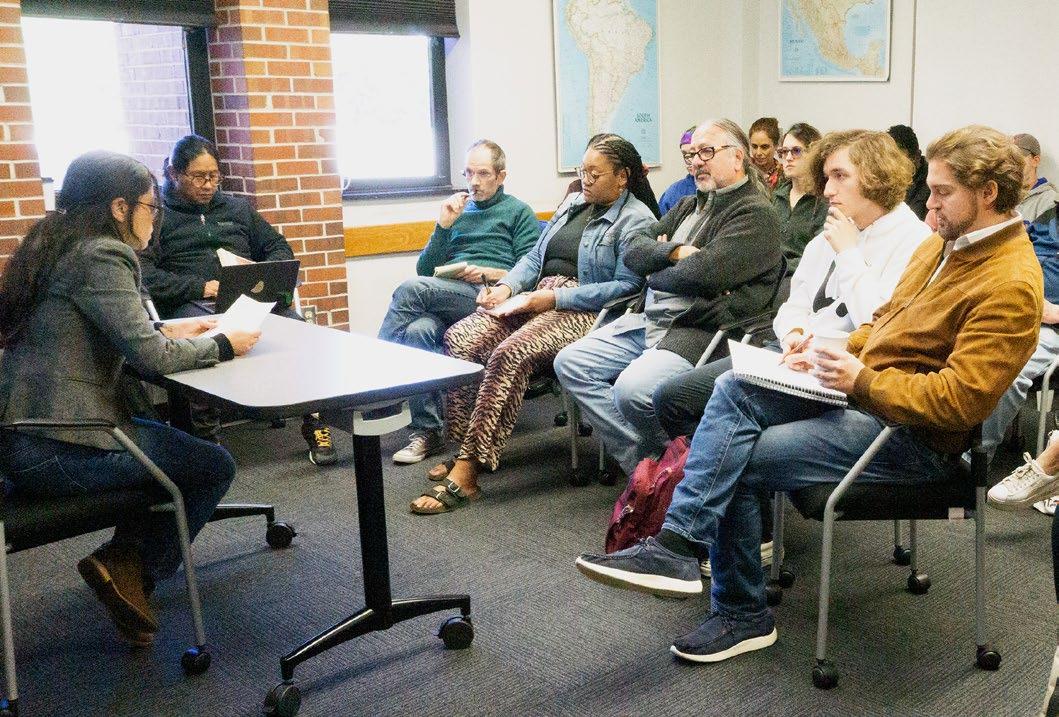
4 minute read
The Latinamericanist | Fall 2022
Welcoming Clate Korsant to the Center
New Assistant Director of Academic Affairs brings expertise in teaching and social anthropology, plus enthusiasm for student mentorship and intellectual process
Advertisement
This semester, the Center welcomed a new member to our academic leadership team: Dr. Clate Korsant in the role of Assistant Director of Academic Affairs! Dr. Korsant’s responsibilities include overseeing the Center’s academic programs and advising MALAS students, as well as teaching one course per semester.
The opportunity to work with and mentor graduate students was the spark that ignited Dr. Korsant’s initial interest in the position. “I keep thinking back to what I wish I had known when I was a graduate student,” he says. “I hope I’m able to help them get the most out of grad school, and prepare them on what to expect next, whether it’s a PhD program or a profession.”
Dr. Korsant’s enthusiasm for mentorship stems from his background in teaching, the topic of his first master’s degree and his first jobs out of college. His teaching philosophy is similarly student-centered, with a classroom format that encourages discussion and engagement. “I always want to give students a platform to discuss amongst themselves,” he says. “My job as a teacher is to help students dig deeper into everyday worlds and giving them tools to reach their own conclusions. They’re on an intellectual journey and their learning is never really completed. Teaching is like being a guide on that journey.”

Dr. Korsant (far right) attends MALAS student coloquio
Dr. Korsant’s own intellectual journey was impacted by experiences in a classroom—teaching in a bilingual school in Puerto Rico, where the immersive experience sparked an enthusiasm and inquisitiveness about being around different people. This motivated Dr. Korsant to earn a master’s degree in Cultural Anthropology and a doctorate in Social Anthropology. His dissertation examined socioenvironmental conflict and justice in Costa Rica’s biodiversity-rich Osa Peninsula, where the entanglements between conservation laws, scientists, activists, tourists, and local citizens illuminate the complexities of environmentalism. After completing the dissertation, Dr. Korsant produced and wrote the ethnographic documentary film “Lifting the Green Screen” based on his research.
The project cemented his love for the ethnographic process: following people’s actions at a ground level and bringing in ideas from a range of disciplines to analyze the different dimensions of real-world behaviors and interactions. “I really love what ethnography offers in terms of storytelling, and its intellectual process, and how open it is to bringing in new ideas,” he says. “The science of the human is so broad. You can really look at any problem in a number of ways, but you’re always situated in the question of what people are doing.” He points out that ethnography is particularly suited to Latin American Studies, because it lends itself well to interdisciplinary thinking.
Here at the Center, Dr. Korsant taught “Intro to Latin American Studies” in the fall, and will be translating his research passions into teaching the new course “Ethnographic Storytelling, Subjectivity, and the Visual in Latin America” in the spring. His “Intro” course took a different approach with the discipline: from the perspective of the arts and literature, illuminating Latin America not just as a region, but a network of themes. Undergraduate students got a primer on Latin America through real-world topics at the intersection of culture, history, economy, and infrastructure.
As his first semester comes to a close, Dr. Korsant says that his time at the Center has already proven both rewarding and promising. “My first semester has been a lesson in interdisciplinary education, with explorations in crosscutting interests from social science to ecology to the humanities,” Dr. Korsant reflects. “The dynamic student body is in many ways the soul of the Center and I’m happy to play a role in their journeys. I also continue to be impressed with the college-town community where you’re never far from a gator... both types!” ◆

